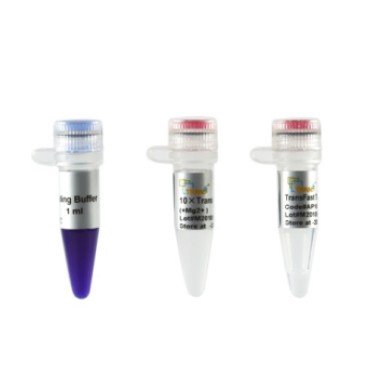The role of Taq DNA polymerase in PCR
What is PCR?
PCR is the abbreviation of polymerase chain reaction, which refers to a method of amplifying specific DNA fragments in vitro through the action of a series of enzymes. The main steps are high-temperature denaturation, low-temperature annealing and extension at a suitable temperature. The three steps form a cycle, and the cycle is repeated 35-40 times to exponentially amplify the target DNA fragments. The detection method only needs a small amount of DNA to obtain results and has the characteristics of strong specificity, high sensitivity, simple operation and time-saving. It can be used for basic research such as gene isolation, cloning and nucleic acid sequence analysis.
Introduction to Taq DNA Polymerase
Just like DNA replication in living organisms, polymerase chain reaction requires a DNA polymerase that uses an existing DNA strand as a template to make a new DNA strand. The DNA polymerase commonly used in PCR is called Taq polymerase, which was isolated from the thermotolerant bacterium Thermus aquaticus.
Taq DNA polymerase is the most commonly used PCR amplification enzyme. This enzyme is extremely thermostable, with a half-life of 40 minutes at 95°C. At its optimum temperature (72°C), nucleotides are incorporated at a rate of 2-4 kilobases per minute. However, polymerases are active over a wide temperature range (Gelfand and White 1990). Therefore, if DNA, primers, and Taq polymerase are mixed together, mispriming and extension may occur at room temperature (before the denaturation step). This will result in the amplification of non-specific targets that can be overcome by using "hot start" PCR techniques.
Taq polymerase has no 3'–5' proofreading activity. However, it has a very low miss rate; estimated to be 1 in 10,000 bases. Proofreading enzymes must be avoided when performing AS-PCR because these enzymes correct intentional mismatches required for genotyping.
Increase PCR specificity and sensitivity
Taq polymerase activity was at 37°C, although its optimal activity was expressed at higher temperatures (about 72°C). This low-temperature polymerase activity underlies the nonspecific amplification associated with mispriming events in the initial stages of the PCR reaction. Before the first step of denaturation at 93-95°C, the oligonucleotide primers can non-specifically anneal to the template DNA, allowing extension to occur. Therefore, several modified polymerases were created to avoid this nonspecific primer extension activity.
By including a thermostable inhibitor of Taq polymerase in the form of a monoclonal antibody, the enzyme is not active until the inhibitor is heat inactivated. Therefore, Taq polymerase becomes active after the high temperature destroys the monoclonal antibody during the initial denaturation phase of the PCR reaction, resulting in the release of functional enzymes. Antibody-mediated inhibition of Taq polymerase allows room temperature assembly of PCR reaction mixtures. By keeping Taq polymerase functionally inactive until a critical temperature is reached, non-specific amplification-related primer expansion caused by mispriming events can be eliminated or reduced.

The role of Taq DNA polymerase in PCR
The polymerase chain reaction, or PCR, is a technique that makes many copies of a specific region of DNA in vitro (in a test tube rather than in an organism). Taq DNA polymerase is a key enzyme in the polymerase chain reaction (PCR), which plays a key role in the synthesis and amplification of new DNA strands.
PCR relies on the thermostable DNA polymerase Taq polymerase and requires DNA primers designed specifically for the DNA region of interest. In PCR, the reaction is repeatedly cycled through a series of temperature changes, resulting in many copies of the region of interest. PCR has many research and practical applications. It is commonly used for DNA cloning, medical diagnosis, and DNA forensic analysis, to name a few.
Like other DNA polymerases, Taq polymerase can only produce DNA in the presence of a primer, a short sequence of 20 nucleotides that provides a starting point for DNA synthesis. However, it is also a thermostable DNA polymerase and can work at higher temperatures.
Taq DNA polymerase is highly efficient, so when it reaches the optimum temperature, it is fully functional. It has a half-life of more than 2 hours (at 92°C), has a high amplification capacity, and can add 150 nucleotides per second.
Professional manufacturer of Nucleic Acid (DNA & RNA) Extraction and Analysis products supplier
GENETURE is a group company,we own two factories: Ascend and Dianrun,to provide one stop solution of Nucleic Acid Extraction and Analysis,including solution for COVID-19. Geneture provides high quality and professional Nucleic Acid Extraction Reagents, Lab consumables, Real-time PCR consumables and test machines.
GENETURE main products including: Nucleic acid extraction or purification kit,Automatic nucleic acid extractor, PCR system, PCR kit, Magnetic beads, and lab consumables of 96 well deep plate,Magnetic rod comb,PCR tube,PCR plate,Pipette tips,centrifuge tubes.
If you have any questions about Taq DNA Polymerase, feel free to contact us.
Email: info@geneture.com
Mobile: +86 150 1002 8687
